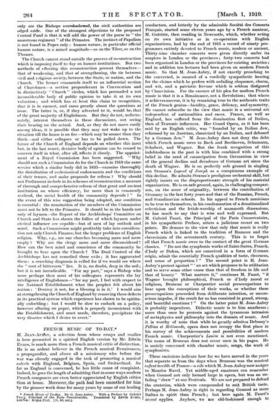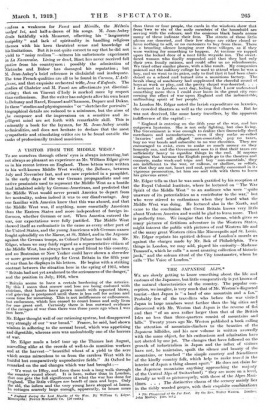FRENCH MUSIC OF TO-DAY.* JEAN-ArltRY, a selection from whose essays
and studies is here presented in a spirited English version by Mr. Edwin Evans, is much more than a French musical critic of distinction. Ito is an ardent believer in the French musical Renaissance, a propagandist, and above all a missionary who before the war was already engaged in the task of promoting a musical entente with England, Belgium, Spain, and Switzerland. So far as England is concerned, he has little cause of complaint. Indeed, he goes the length of admitting that in some ways modern French composers are even better appreciated by English critics than at home. Moreover, the path had been smoothed for him by the pioneer work done for many years by some of ors• leading
• French Meek of To-day. By 0. Jean-Auley. with a Prelate by Galniel r.rotg;LI'rkelpalrootstthet31'.acfals .Ceriservatolle. Translated by EdwW Evans. conductors, and latterly by the admirable Societe des Concerts Frans's, started some eleven years ago by a French amateur, M. Gueritte, then residing in Newcastle, which, whether acting on its own initiative or in co-operation with English organizations, had by the end of 1915 a record of ninety pro- grammes entirely devoted to French music, modern or ancient, Thirty-nine chamber concerts were given directly under its auspices in London or the provinces ; forty-two concerts had been organized in London or the provinces for existing societies ; and in addition ten lectures had been given on modern French music. So that M. Jean-Aubry, if not exactly preaching to the converted, is assured of a cordially sympathetic hearing for the claims which he prefers with unfailing eloquence, charm, and wit, and a patriotic fervour which is seldom disfigured by Chauvinism. For the essence of his plea for modern French music is that it is a Renaissance, not a Revolution; that where it achieves success, it is by remaining true to the authentic traits of the French genius—lucidity, grace, delicacy, and symmetry. He cannot subscribe to the view that music is a universal art independent of nationalities and races. France, as well as England, has suffered from the domination first of Italian, then of Teutonic influences. Her Grand Opera, as it has been said by an English critic, was " founded by an Italian Jew, reformed by ass Austrian, classicized by an Italian, and debased by a German Jew." H. Jean.Aubry does not deny the debt which French music owes to Bach and Beethoven, Schumann, Schubert, and Wagner. But the frank recognition of this indebtedness in the past is with him combined with a strong belief in the need of emancipation from Germanism in view of the general decline and decadence of German art since the death of Wagner. He is on perfectly safe ground in singling out Strauss's Legend of Joseph as a conspicuous example of this decline. He admits Strauss's prodigious orchestral skill, but rightly inside on the disproportionate strength of his material organization. He is on safe ground, again, in challenging compari- son, on the score of originality, between the contribution of Germany in the last forty years and that of the Russian, French, and Scandinavian schools. In his appeal to French musicians to be true to themselves, in his condemnation of a denationalized eclecticism and the fetish-worship of mammoth dimensions, he has much to say that is wise and well expressed. But M. Gabriel Faure, the Principal of the Paris Conservatoire, in his sympathetic Preface, utters a judicious caveat on two points. He demurs to the view that only that music is really French which is linked to the tradition of Rameau and the claveeinists of the seventeenth century. This is to forget all that French music owes to the contact of the great German classics. " Do not the symphonic works of Saint-Satins, Franck, d'Indy or Dukes, which are conceived in a form of German origin, admit the essentially French qualities of taste, clearness, and sense of proportion ? " The second point is M. Joan- Aubry's protest against " an art which proposes to be utilitarian and to serve some other cause than that of freedom in life and that of beauty' What matters it," continues M. Faure, "if Wagner brought philosophical, Franck or d'Indy moral or religious, Bruneau or Charpentier social preoccupations to bear upon the conceptions of their works, or whether these preoccupations proceeded from deliberate intention, or uncon- scious impulse, if the result for us has consisted in grand, strong, and beautiful emotions ? " On the latter point M. Jean-Aubry is probably impenitent•. Didactic music is to him anathema ; more than once he protests against the tyrannous intrusion of metaphysics and philosophy into the domain of music. And it is worthy of note that while he greatly admires Debussy's Pelleas et Id elisande, opera does not occupy the first place in his survey of the achievements and possibilities of modern French music. Charpentier's Louise is not even mentioned. The name of Bruneau does not occur once in his pages. He is mainly concerned with chamber music, songs, the work of symphonists.
These omissions indicate how far we have moved in the years that separate us from the days when Bruneau was the musical enfant terrible of France—a rae which H. Jean-Aubry now assigns to Maurice Ravel. Yet middle-aged amateurs can remember when Gounod not only loomed large in opera, but was an un- failing "draw " at our Festivals. We are not prepared to defend the oratorios, which were compounded to suit British taste. Perhaps M. Jean-Aubry is right in regarding Gounod as more Italian in spirit than French ; but here again M. Faure's cereal applies. Anyhow, we are old•fashioned enough to :Anima a weakness for Faust and Mireille, the Midecia ma/pre lei, and half.a.dozen of his songs. M. Jean-Aubry deals faithfully with Massenet, offsetting his "languorous insipidity" and lack of spirituality in handling religious themes with his keen theatrical sense and knowledge of his limitations. But it is not quite correct to say that he did not yield to "noisy realism "—witness his unfortunate experiment in La Bararraise. Living or dead, Bizet has never received full justice from his countrymen : possibly the admiration of Nietzsche and Billow has damaged his reputation ; but B. Jean-Aubry's brief reference is disdainful and inadequate. The true French qualities are all to be found in Carmen, L'Arli- sienne, and that exquisite orchestral trifle, Jeux SEnjants. Tho studies of Chabrier and M. Faure are affectionate yet discrimi- nating; that on Vincent &Indy- is marked more by respect than enthusiasm. But the writer has subjects after his own heart in Debussy and Ravel, Roussel and Channel', Dupare and Dukes. In these " studies and physiognomies " or " sketches for portraits" biographical details are reduced to a minimum, but the aims of the composer and the impressions on a sensitive and in- telligent mind are set forth with remarkable skill. This is eminently a book for the layman, for H. Jean-Aubry avoids technicalities, and does not hesitate to declare that the most sympathetic and stimulating critics are to be found outside the ranks of professionally trained musicians.



































 Previous page
Previous page